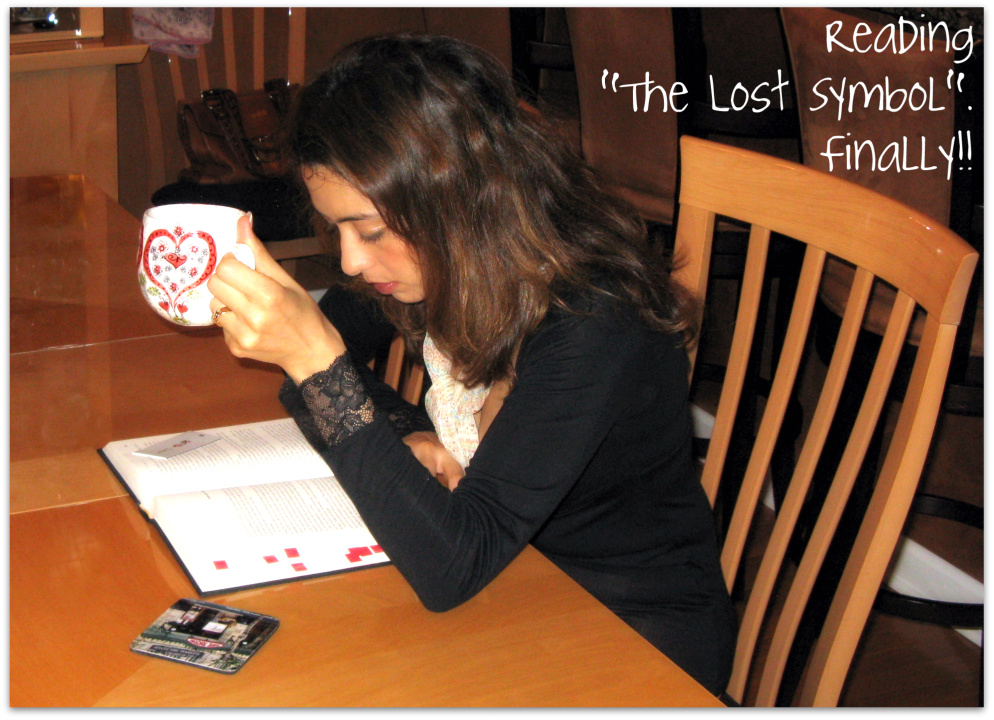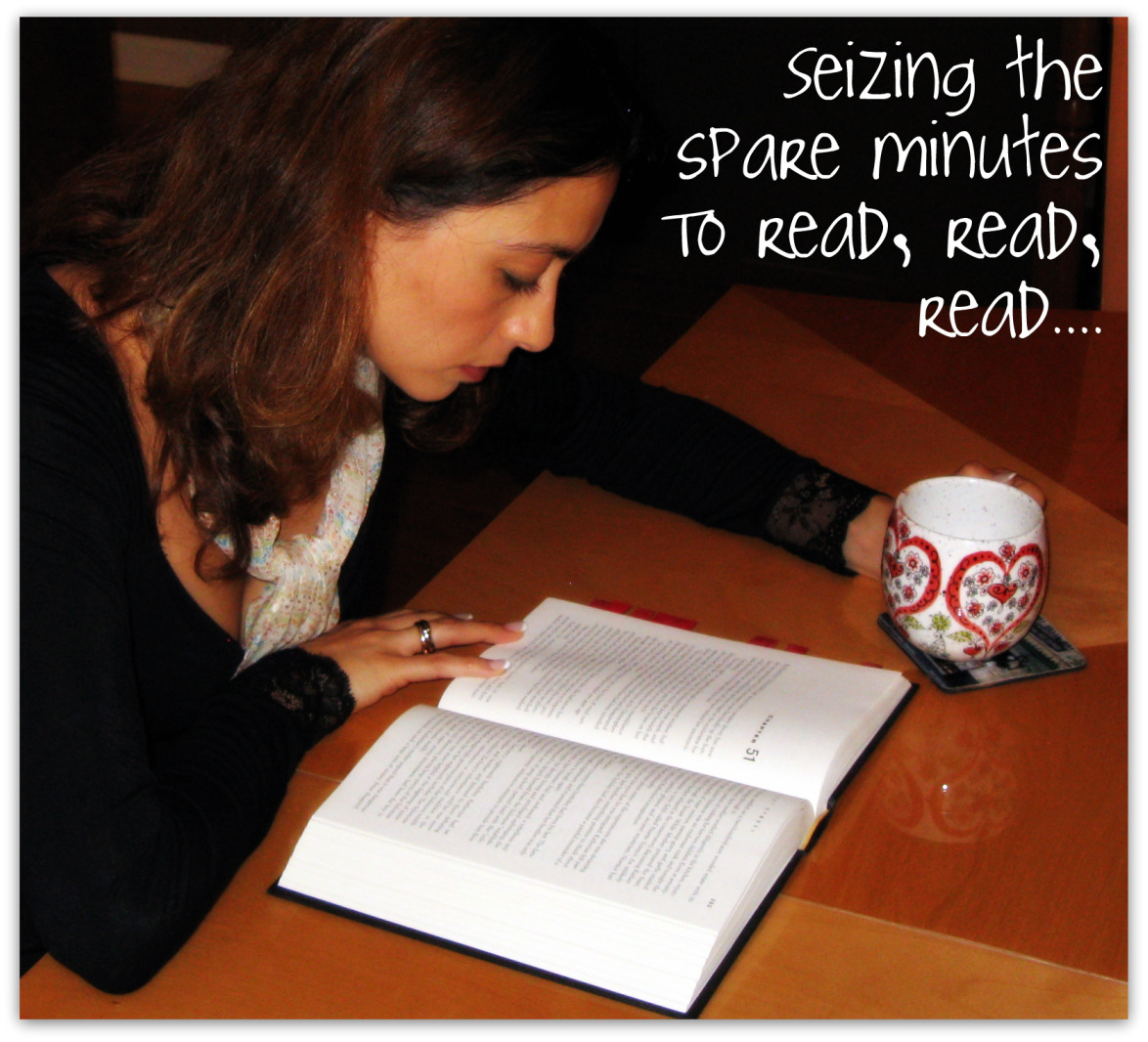Finally, I broke the sweet spell of Anna Karenina! Not counting the wonderful short read of Alice in Wonderland on my iPhone, I managed to finish a respectable book following Tolstoy: Dan Brown’s “The Lost Symbol”. Truth be told, I pre-ordered my copy last September (can you tell how I felt about The DaVinci Code, not to mention Angels & Demons?) and let it collect dust, waiting for inspiration to hit me (A Washington DC setting? Really? After Italy and France?), and I kept waiting. After seeing this book featured in every imaginable book store window everywhere during my recent travels (Montreal, Seattle, DC, Argentina, London, Hawaii, you-name-it), my curiosity got the best of me and two weeks ago, I cracked open this 509 page hard cover, determined not to stop til all lost symbols were found and clearly explained!

Reading is an evolution onto itself. The concept of appreciating a book used to be black and white for me, love it or hate it, read it or discard it immediately. When I did not like a book, it evoked heaps of frustration rather than casual indifference! In recent years, I have developed my palate more and it is wonderful to see all shades of color in between the black and white. There are books we love and authors we worship and then there are books we can hardly stand with insufferable plots and despicable writing and then there is everything in between. It pays to have a refined scale of gratitude for books especially when moving in between genres and across centuries!
“The Lost Symbol” did one thing well for me: It aroused my curiosity and interest around the ancient mysteries of this world, the lines where science and mysticism may intersect someday and shed light on all that remains unknown to man from the lost wisdom of the ages. The unimaginable secrets lost in the pages of history intrigue us all and this story draws us into that world and attempts to build our hope and imagination on finding these answers, be it in Washington DC or any another corner of the world, location is inconsequential to the large purpose which Brown pursues in his latest novel.
If you have not read the book, I was careful not to put any spoilers in this review. Up to you to read this now or later. Please choose wisely!
There is the inherent problem of reading a third Dan Brown book: Robert Langdon is yanked out of his swimming pool at Harvard yet again, lured into the city for doing a favor to a very rich and powerful friend who naturally belongs to a super secret society (in this case, the Freemasonry, a brotherhood protecting secrets of the sages) and who, not so naturally, is in a particular dilemma which only Langdon can resolve! I admit, it took me a while to take the plot seriously. The benefit of being as clueless as me in how the plots for mysteries and thrillers generally unveil is the constant surprise factor; whereas my smart mother-in-law would have seen the whole thing coming from the start, I was beside myself with the twists and turns in the story, this being quite obviously from my lack of reading enough thrillers or my strict diet when it comes to TV shows ;)! Alas, Brown managed to reasonably entertain me on the plot level and in return, I forgive him for the over-dramatic scenes and the repetition of characters and sub-plots from his previous works (although this may just be the last time!)
Writing thrillers is not Dan Brown’s strength or his driving force. His main purpose is to awaken our inquisitive nature in those larger than life questions, the evolution of miracles into intelligence and science, man’s quest for knowledge, truth, freedom, answers, and the ever-burning question of after-life. Moreover, Brown touches on one very common but powerful message: that knowledge and information in the wrong hands can be irreparably destructive. The purpose of these fraternal societies (reciting Isaac Newton as belonging to them among other great scientists of our time) has been to protect those secrets from this potential peril. The ill-intentioned ones exist in society and so releasing that information to public would never be without great consequence. Whatever I may believe about the past or the present and human nature aside, that message resonated with me in this life and this reality.
Brown has his own approach to writing these series of novels. He gains reader credibility by starting with a series of facts (see disclaimer on the first page) and finally connects the dots, where they may or may not any exist. He does not fabricate as much as he draws conclusions and in the end, he always leaves the reader with choice of a final interpretation. His drama may have been a let down but his core message came across and that was enough for me.
Reading is the best pastime for an active mind! If you like to see the other book reviews, check the index of In Print.
The Lost Symbol plot then, while entertaining, became secondary for me and on completely unrelated notes to this plot, I have shared some of my favorite quotes from the book. The source of these quotes is Dan himself to my knowledge, but perhaps he may have borrowed or paraphrased them:
“Wide acceptance of an idea is not proof of its validity”
“One could argue that there exist certain questions that are best left unanswered.”
“The Ancient Mysteries have spawned many myths but that does not mean they themselves are fiction.”
“If our ancestors could see us today, surely they would think us gods.”
“There is a hidden world behind the one we all see. For all of us.”
“All great truths are simple.”
How does this compare to Brown’s previous work? Did I love this like I loved the Da Vinci Code and Angels & Demons? No, definitely not, but that’s neither here nor there. Comparison is a brutal way of assessing something but alas, authors cannot seem to escape the disposition especially after a best-seller.
Brown takes more than his fair share of beating on 2400+ Amazon reviews so I will close with this inspiring note after watching his interview video on Amazon: I admire that Dan Brown wakes up at 4am every day and locks himself up in a small cottage void of communication to outside world and far away from all human contact, equipped only with a refrigerator and a computer for typing; there he slips into a trance where he can write, create, and produce for hours on end. It is the best example to Focused Intensity and self-discipline, all of which I try to constantly pursue in my own endeavors. It is important to genuinely like the people behind the work and like and respect I have in great volume for Dan Brown.

 I am Farnoosh, the founder of Prolific Living. So glad you are here. My mission is to empower you to unblock your creative genius to live your dream life.
I am Farnoosh, the founder of Prolific Living. So glad you are here. My mission is to empower you to unblock your creative genius to live your dream life.